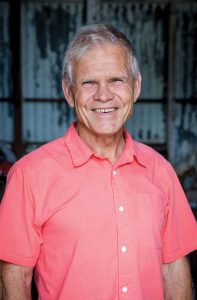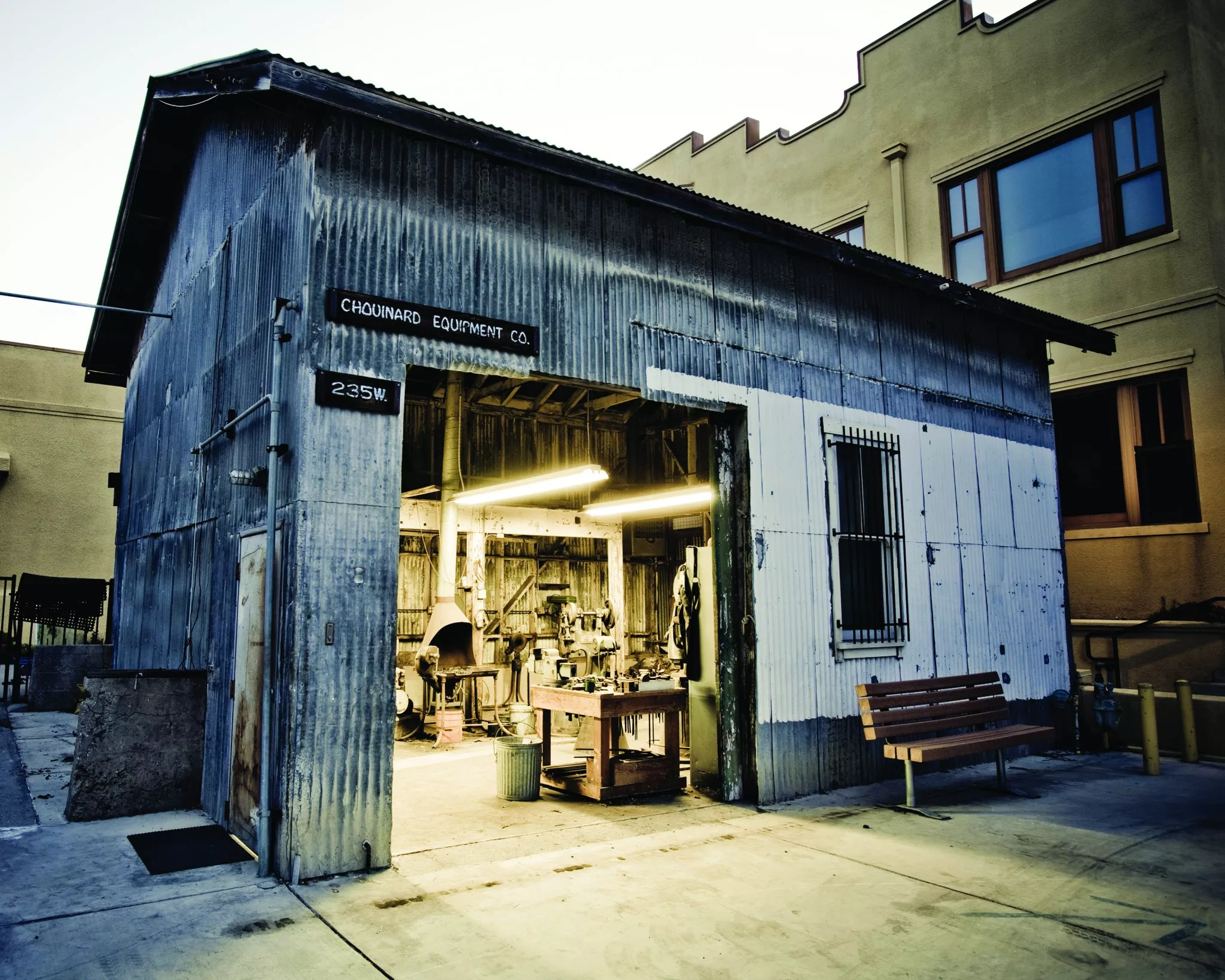As part of our series of conversations with key leaders at outdoor apparel maker Patagonia, we spoke with Rick Ridgeway, the company’s vice president of public engagement, about what it really means to put many of the company’s sustainability commitments into practice.
For more on the company’s philosophy and practices, check out our interview with CEO Rose Marcario. And join us at our Global Leaders Forum in San Francisco, June 7-9, 2017, to learn more from Ridgeway himself.
So what do you do? What’s “Vice President of Public Engagement” mean?

Rick Ridgeway is an accomplished mountaineer and VP of public engagement at Patagonia.
Rick Ridgeway: My responsibility is to tell the public who we are, what we do, and why we do it. I define “public” to include all our stakeholders — not only customers and civil society, but NGOs, universities, other companies that fall into our orbit of influence. I end up being the face for the company.
Especially for those audiences that don’t know who we are, I begin with the fact that we’re a privately held company. And then I explain that the owners of the company have not sold it, because they want to use it for a tool for environmental protection and now also for social justice.
When you look at business as a tool, how does that change the way you operate?
RR: Yvon and Malinda still fly coach, for example; it’s a company policy not to fly in the front of airplanes because it costs so much. People assume that we’re talking about making more money. No, what we’re talking about is redirecting money from the airlines to the environmental community. If you don’t spend all that money to sit in the front of the plane, you have more money to give to environmental groups. That attitude has created a business that acts as much like a not-for-profit as a for-profit company perhaps can achieve.
What are the official core values of the company?
Number one is a chartered commitment to 1% For The Planet. We are obligated to give 1 percent of our revenue to small environmental grassroots groups fighting to protect the planet. Number two is we are required to build the very best product the teams here are capable of creating while causing no unnecessary harm, to the planet, its societies, or its biodiversity.
Is “no unnecessary harm” the most important thing?
RR: No. The most important thing is to build the best product. They go together. They define tension. It’s integrated into those two phrases combined. Tension is part of building the best product while causing no unnecessary harm.
Notice that it doesn’t say, “cause the least harm.” It’s altogether a different phrase to say, “cause no unnecessary harm;” it’s a double negative. And if you take out the two negatives, what have you got? You’re causing harm. That phrase recognizes the fact that building anything causes harm.
So you’re comfortable with that?
RR: That’s the tension. Implicit in “build the best product” is our recognition that building the best product you can often results in building the most durable product you can. When you build the most durable product you can, then, assuming the owner of that product gets everything they can out of it, the footprint of that product on our planet is going to logarithmically reduce. We know this from life cycle assessment, a scientific analysis of the footprint of a product over its lifetime. If that jacket continues to serve its owner 10, 15, 20 years out, then that jacket’s footprint on the planet logarithmically decreases.
If at the same time we made that jacket with no unnecessary harm — recognizing that some of it is going to be harmful — and if at the same time we’re encouraging people to not buy that jacket unless they really need it, then that is probably reducing the impact of our business on the planet as much as we possibly can under any business model, recognizing that we’re going to wear jackets.
That sounds like a flippant thing, “that we’re going to wear jackets,” but let me tell you, a lot of our critics don’t even start there. They don’t stop and think that we’re all going to wear clothes. Because if you start the conversation by looking at somebody and saying, “I notice you’re wearing clothes. Are you going to continue to wear clothes?” they look at you like you’re crazy. Then you say, “Well, since you’re going to wear clothes, what kind of clothes are you going to wear?” Then let’s start the conversation there.
Can you give an example of that tension between “building the best product” and “causing no unnecessary harm”?
RR: One of the textbook examples of the tension is the wrestling match we’ve had here for several years now over our durable water resistant (DWR) coating on our shell jackets. We’ve replaced the chemistry from one that was causing some considerable harm on the environment through fluorocarbon chemistry with one that is less harmful but still harmful. In analyzing and considering all the other potential replacements — and this has been going on for a few years now — they’ve all resulted in a degradation of the durability of the product.
From an objective life cycle assessment perspective, if we replace the chemistry in the coating with one that really has no harm on the environment, the overall impact on the planet of giving somebody a jacket that’s only going to last one or two years instead of one that’s going to last for ten or fifteen or twenty years, is greater. That means we cannot possibly be comfortable, much less complacent, with where we’re at, because it’s not nearly good enough.
We’ve got all kinds of efforts going on here on several different fronts, and “front” is a good word because it feels like a war sometimes, in trying to figure out a better solution to this conundrum we have over that DWR coating. And we’re transparent about it. You can go find on our blog, we say, “You know what? We’re doing harm here. Here’s what we’re trying to do about it. You got any ideas? We want to hear from everybody.”
What advice would you give to new social entrepreneurs?
RR: Foremost: avoid personal greed — for power, especially. The second thing is to avoid, as much as possible, ever allowing skeletons into your closet.
Give me an example of that. Are we talking about having an extramarital affair? Are we talking about doing something under the rug with the books?
RR: If you are engaging in behaviors that would create anything from embarrassment to jail if they got outside your walls, that’s the skeletons I’m talking about. If you don’t have those, what happens is that you can be completely comfortable with transparency.
The degree to which you can become comfortable with transparency is also the degree to which, as a leader, you can find satisfaction and meaning.
This company defines transparency as a willingness to be open about not only everything we think is good, but where we think we’re falling short. When we do find ourselves engaged in something embarrassing or uncomfortable, then, honoring our own definition of transparency, we’re willing to talk about it.
I really saw it in action a few years ago. Some of the people who run our social environmental responsibility unit came to us and said, “We’ve made the startling and super uncomfortable discovery that our suppliers, seven or eight of them based in Taiwan, effectively have slaves in there.”
We’re all in this room a little bit bigger than this one. There’s maybe eight of us or something, and everybody’s just listening. It starts to sink in. Then the reactions come out. And the very first reaction from everybody — and this was universal — was: “We’ve got to do something about this.” Second was, “We can’t do it on our own. This kind of systems problem has to involve the factories themselves, and it likely has to involve government.” And number three, “We have to go public with this as fast as possible.”
So there was nobody there saying, “Hold on. How do we put this under the covers and push it away?”
RR: Everybody reacted that way because everybody knew intuitively that then you’re going to get the public to help you, because they’re going to sense your honesty. They’re going to respect it. And they’re not going to tar and feather you for a problem as egregious as this one because they’ll know you’re sincere about finding a solution.
The skeptic might say that you guys were just being really smart about the PR game, if you expose your own problem versus somebody else exposing it.
RR: Yeah. There’s validity in that, because we all know is going to avoid bad press. So that’s part of the mix, and we’d be disingenuous to say otherwise. But at the same time, I can tell you with complete confidence that everyone knew that it was the right thing to do, and knew that they were never going to get any blowback for making that choice. It’s consistent with our culture.
That’s pretty cool, because when you have behaviors that produce business value that also line up with truly operating in a way that improves the planet and its societies, well, what a perfect alignment is that? That’s a really important message for all your readers. It’s an important message for everybody in business. It’s understanding that these kinds of behaviors , at the end of the day, while sometimes uncomfortable, can create really meaningful business value for your organization.
Patagonia recently pulled out of the Outdoor Retailer Show in Salt Lake City to protest Utah’s policy toward public lands, and has been supporting the Bears Ears National Monument. What has been the most impactful thing Patagonia has done in terms of advocacy?
RR: First of all, I’d like to use the word “activist” rather than advocacy. “Activist” has the sense of more of a proactive active engagement; it includes that core idea of action. And that’s certainly what this company is committed to do.
Besides the ones you mentioned, the other recent commitment to supporting activism was our Black Friday commitment in 2016 to give everything we made in a single day to grassroots environmental organizations. It was a commitment that was an appropriate response to the outcome of the fall elections. We raised $10 million in one day, when we only projected between $2 and $3 million in sales. I think we surprised ourselves with that one. Now we’ve raised the bar, even on ourselves.
I was really proud of this company, as was everybody that works here. And just as gratifying, if not more, was the support we had from the public, and not just from our customers. About 60 percent of the people who came and supported us that day were new to the company. It was a statement that they were all making. Not to us, but through us, to the world. I was really proud of that, too, that we could have activated that many people to come out and say, “Okay, I’m going to support this company because what I’m really supporting are the values it represents. I’m supporting them now because they are counterpoint to the current political direction of this country.”
Do businesses and business leaders have a responsibility to be activists?
RR: Yes, they do. And more now than ever, because we can’t rely on government at all. It’s not just this government. We’re seeing other governments —Britain and possibly France, we’ll see where the elections go through the rest of this calendar year — continuing to abandon their responsibilities towards long-term protection of the planet and the societies that the planet supports. It’s up to civil society and it’s up to business. It’s up to religious leaders and non-governmental organizations.
It is incumbent upon all business to rise to the occasion, and it’s in their self-interest. I continue to be perplexed by how many businesspeople I seem to still run into who are unable to connect those dots. They don’t seem to be able to see that their businesses — whether they’re in consumer goods or services — depend on the planet’s ability to provide the natural resources that sustain all business, and the health, clean air, and clean water that come from a healthy earth that, in turn, support healthy societies.
They don’t seem to understand the most fundamental of connections, that without healthy societies, none of them are going to have healthy markets. I am astounded by people who seemingly are so bright and who have such abilities to run big companies who don’t even seem to make that most fundamental of connections to their business and its long-term health. I admit that that’s not necessarily connected to the short-term health, but if none of them can see long term, they don’t really deserve to be in their positions of leadership.
Is there any benefit in the short-term health in terms of branding or customer loyalty, for example?
RR: Yeah, there certainly is. It depends on what you put under that rubric of “activism.” But if you include, more broadly, the whole suite of initiatives and commitments that fall under the umbrella of “sustainability,” so many of them are short-term benefits.
Certainly, any business leader should be considering just the cost-savings they can enjoy from managing things like waste and carbon intensity and water input, toxic discharges. Certainly they should be able to understand the risk that’s involved to their companies if they don’t manage those things. And certainly they can look around and see the brand benefit their competitors who are making the commitment are getting from it.
Certainly, if they’re like me and they’re out there talking to the best and brightest coming out of our business world today, they should realize that those young people are not going to work for them if they don’t commit to these things, and commit to it transparently, because they’ll get found out right away if they’re not transparent.
There’s all kinds of other short-term benefits. One that I think is getting on the radar of business leaders today is the degree to which these commitments are affecting their stock value, as more fund managers are paying attention to sustainability because they’re realizing that it’s a proxy for business success overall.
Are there any activism actions that you’ve taken that you’ve regretted or have damaged your brand in any way?
RR: When we look back over our choices and decisions, even long-term, going back to the beginnings of the company in the 70s, there aren’t any environmental or social justice commitments we made that we regret, and that, further, didn’t end up creating some sort of business value for us long-term. We looked back through the main ones and every single one ended up helping our business.
Right from the very beginning, even before “Patagonia” existed, when it was just a company making climbing hardware — pitons and carabiners — we abandoned the pitons to go with the chocks, the wedges that you put in the cracks, because they didn’t do any harm like pitons did. The business took off from that, because it created a whole new market for new equipment. It was a fundamental lesson. Do good for the planet, and guess what, you end up doing good for your business. Looking back at it, just time and again, that has been the outcome.
Boy are there ever a lot of examples of commitments we made that did have eventual benefit. And some of them we’ve been clever about. Like once we got hammered by some pro-life group that decided to picket our stores because of our support for Planned Parenthood. That looked like we were going to take a hit, because there were hundreds of protesters across the country in front of all our stores. But then we made a public announcement that all the managers of all our stores were getting a directive to go out and count the number of picketers in front of their stores, and for every one, they were giving $100 to Planned Parenthood. The picketers disappeared immediately. We got a lot of people rallying and supporting us for that. What looked like it was going to be a business hit because of a political position for women’s rights turned out to still provide plenty of support for the business.
All politics aside, what still gets you up in the morning and gives you hope?
RR: I’m an environmentalist and a conservationist. I’ve been an outdoor athlete, as we call them here, a mountaineer all my life. Before I came to work here, I once calculated that I spent about six years of my life living in tents in wild places. That’s a long time. Preserving and conserving biodiversity has been one of the most important topics for me, and it’s one of the things I’ve tried to contribute solutions to. That’s one of the great satisfactions I get from working at this company, because it uses so much of the wealth that it creates to support the protection of biodiversity and the conservation of wild places. That’s closest to my heart. It’s in alignment with my personal values.
I’ve had the privilege of working with, arguably, the foremost conservation biologist in the world, George Schaller. And in that work, George told me one time, when we were on this topic of how to remain optimistic and how to get up in the morning and go back at it, he said, “The foremost thing you need to do is wake up in the morning, stretch your arms, take in a deep breath, and then remind yourself that today you’re not going to save the world. But today you’re going to focus on saving one small, discreet, very clearly defined part of it.”
I think about that all the time. And I think about it now in the context of what we’re going to see , and I double down on that commitment to wake up in the morning, take a breath, and really be clear about that one little action you’re going to do, you and me, to create the world that we want to see. And you can never let go of that. Because if you let go of that, it’s all over.





